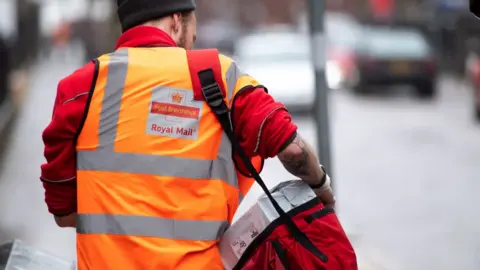Royal Mail parcels overtake letters for first time
 Getty Images
Getty ImagesRoyal Mail has said revenue from parcel deliveries has surpassed letters for the first time, fuelled by a surge in online shopping during the pandemic.
The postal group said turnover from parcels now makes up 60% of its total revenue, which rose by nearly 10% in the first half of its financial year.
But it was not enough to stop a sharp drop in profits, due to a number of costs including extra staff to sort the increased parcel volume by hand.
Pre-tax profit fell 90.2% to £17m.
During the six months to 27 September, Royal Mail's increased costs included £85m related to Covid-19 as well as £147m on voluntary redundancies due to a continuing restructuring of the business.
While revenue from letters dropped by 20.5%, parcel rose by 33.2%.
Royal Mail said that on its busiest day it processed 2.5 million tracked parcels while its international parcels business, GLS, also saw increased volumes, "in particular as China emerged from Covid-19 restrictions and economic activity increased early in the period".
However, it added that growth in international volumes "weakened" as the first half progressed, "impacted by reduced global air capacity" and other increased costs.
'A milestone'
"Royal Mail's performance continues to reflect structural changes in the sector, which have only intensified through the Covid-19 pandemic," said John Moore, senior investment manager at Brewin Dolphin.
"The fact that for the first time parcels revenue is now larger than letters revenue is a milestone for the business and only goes to underline the importance of Royal Mail's restructuring programme, which was long overdue even when it was introduced."
At present only a third of parcels dealt with by Royal Mail are processed through a parcel sorting machine, with the majority sorted by hand.
The increased volume incurred higher costs for Royal Mail such as taking on extra staff, personal protective equipment to guard against the coronavirus as well as social distancing measures.
"Due to the uncertain risks over future infection rates, there are challenges in being able to accurately predict volumes and potential impact on absence rates," Royal Mail said.
The company is investing in four more parcel sorting machines, however the first one will only start after Christmas and the remainder will be installed in the next financial year.
It is currently building a parcels hub in the north west, which is scheduled to become operational in 2022 and it has begun construction of a similar facility in the midlands.
 Getty Images
Getty ImagesSusannah Streeter, senior investment and markets analyst at Hargreaves Lansdown, said that "adapting to the e-commerce boom is proving a painful shift for the company".
"With demand for letters plummeting, there is a risk that the red post box could go the same way as the iconic telephone box, revered for its history and not its usefulness," she added.
Looking ahead, Royal Mail said it was difficult to give an outlook for its second half, "given the uncertainty surrounding the development of the pandemic in the remainder of the year and possible recessionary impacts across our business, which could have a significant influence on parcel volumes".
In the meantime, it said it was preparing for the peak Christmas period and is recruiting around 33,000 additional flexible workers to handle the expected demand.
